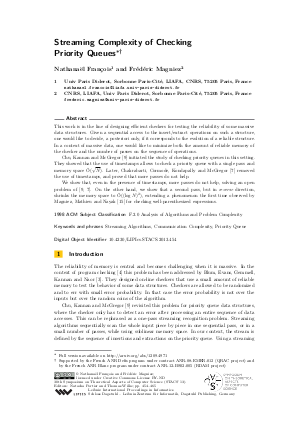Streaming Complexity of Checking Priority Queues
Authors Nathanael Francois, Frédéric Magniez
-
Part of:
Volume:
30th International Symposium on Theoretical Aspects of Computer Science (STACS 2013)
Part of: Series: Leibniz International Proceedings in Informatics (LIPIcs)
Part of: Conference: Symposium on Theoretical Aspects of Computer Science (STACS) - License:
 Creative Commons Attribution-NoDerivs 3.0 Unported license
Creative Commons Attribution-NoDerivs 3.0 Unported license
- Publication Date: 2013-02-26
File

PDF
LIPIcs.STACS.2013.454.pdf
- Filesize: 0.66 MB
- 12 pages
Document Identifiers
Subject Classification
Keywords
- Streaming Algorithms
- Communication Complexity
- Priority Queue
Metrics
- Access Statistics
-
Total Accesses (updated on a weekly basis)
0PDF Downloads0Metadata Views
Abstract
This work is in the line of designing efficient checkers for testing the reliability of some massive data structures. Given a sequential access to the insert/extract operations on such a structure, one would like to decide, a posteriori only, if it corresponds to the evolution of a reliable structure.
In a context of massive data, one would like to minimize both the amount of reliable memory of the checker and the number of passes on the sequence of operations.
Chu, Kannan and McGregor (M. Chu, S. Kannan, and A. McGregor, 2007) initiated the study of checking priority queues in this setting. They showed that the use of timestamps allows to check a priority queue with a single pass and memory space \tilde{\Order}(\sqrt{N}). Later, Chakrabarti, Cormode, Kondapally and McGregor (A. Chakrabarti, G. Cormode, R. Kondapally, and A. McGregor, 2010) removed the use of timestamps, and proved that more passes do not help.
We show that, even in the presence of timestamps, more passes do not help, solving an open problem
of (M. Chu, S. Kannan, and A. McGregor, 2007; A. Chakrabarti, G. Cormode, R. Kondapally, and A. McGregor). On the other hand, we show that a second pass, but in reverse direction shrinks the memory space to \tilde{\Order}((\log N)^2), extending a phenomenon the first time observed by Magniez, Mathieu and Nayak (F. Magniez, C. Mathieu, and A. Nayak, 2010) for checking well-parenthesized expressions.
Cite As Get BibTex
Nathanael Francois and Frédéric Magniez. Streaming Complexity of Checking Priority Queues. In 30th International Symposium on Theoretical Aspects of Computer Science (STACS 2013). Leibniz International Proceedings in Informatics (LIPIcs), Volume 20, pp. 454-465, Schloss Dagstuhl – Leibniz-Zentrum für Informatik (2013)
https://doi.org/10.4230/LIPIcs.STACS.2013.454
BibTex
@InProceedings{francois_et_al:LIPIcs.STACS.2013.454,
author = {Francois, Nathanael and Magniez, Fr\'{e}d\'{e}ric},
title = {{Streaming Complexity of Checking Priority Queues}},
booktitle = {30th International Symposium on Theoretical Aspects of Computer Science (STACS 2013)},
pages = {454--465},
series = {Leibniz International Proceedings in Informatics (LIPIcs)},
ISBN = {978-3-939897-50-7},
ISSN = {1868-8969},
year = {2013},
volume = {20},
editor = {Portier, Natacha and Wilke, Thomas},
publisher = {Schloss Dagstuhl -- Leibniz-Zentrum f{\"u}r Informatik},
address = {Dagstuhl, Germany},
URL = {https://drops.dagstuhl.de/entities/document/10.4230/LIPIcs.STACS.2013.454},
URN = {urn:nbn:de:0030-drops-39561},
doi = {10.4230/LIPIcs.STACS.2013.454},
annote = {Keywords: Streaming Algorithms, Communication Complexity, Priority Queue}
}
